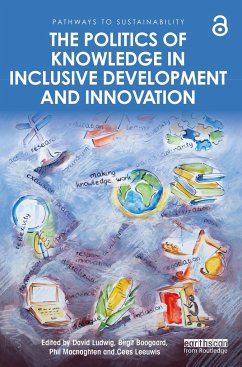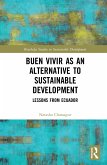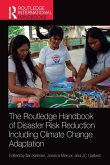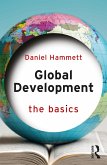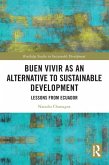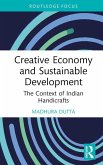The Politics of Knowledge in Inclusive Development and Innovation
Herausgeber: Ludwig, David; Macnaghten, Phil; Boogaard, Birgit
The Politics of Knowledge in Inclusive Development and Innovation
Herausgeber: Ludwig, David; Macnaghten, Phil; Boogaard, Birgit
- Broschiertes Buch
- Merkliste
- Auf die Merkliste
- Bewerten Bewerten
- Teilen
- Produkt teilen
- Produkterinnerung
- Produkterinnerung
This book develops an integrated perspective on the practices and politics of making knowledge work in inclusive development and innovation. The six parts of the book address the complex interplay of knowledge and politics.
Andere Kunden interessierten sich auch für
![Buen Vivir as an Alternative to Sustainable Development Buen Vivir as an Alternative to Sustainable Development]() Natasha ChassagneBuen Vivir as an Alternative to Sustainable Development179,99 €
Natasha ChassagneBuen Vivir as an Alternative to Sustainable Development179,99 €![The Routledge Handbook of Disaster Risk Reduction Including Climate Change Adaptation The Routledge Handbook of Disaster Risk Reduction Including Climate Change Adaptation]() The Routledge Handbook of Disaster Risk Reduction Including Climate Change Adaptation49,99 €
The Routledge Handbook of Disaster Risk Reduction Including Climate Change Adaptation49,99 €![Global Development Global Development]() Daniel HammettGlobal Development28,99 €
Daniel HammettGlobal Development28,99 €![Buen Vivir as an Alternative to Sustainable Development Buen Vivir as an Alternative to Sustainable Development]() Natasha ChassagneBuen Vivir as an Alternative to Sustainable Development45,99 €
Natasha ChassagneBuen Vivir as an Alternative to Sustainable Development45,99 €![Traditional Ecological Knowledge and Global Pandemics Traditional Ecological Knowledge and Global Pandemics]() Ngozi Finette UnuigbeTraditional Ecological Knowledge and Global Pandemics74,99 €
Ngozi Finette UnuigbeTraditional Ecological Knowledge and Global Pandemics74,99 €![Creative Economy and Sustainable Development Creative Economy and Sustainable Development]() Madhura DuttaCreative Economy and Sustainable Development68,99 €
Madhura DuttaCreative Economy and Sustainable Development68,99 €![The Routledge Handbook of Environment and Communication The Routledge Handbook of Environment and Communication]() The Routledge Handbook of Environment and Communication48,99 €
The Routledge Handbook of Environment and Communication48,99 €-
-
-
This book develops an integrated perspective on the practices and politics of making knowledge work in inclusive development and innovation. The six parts of the book address the complex interplay of knowledge and politics.
Produktdetails
- Produktdetails
- Pathways to Sustainability
- Verlag: Taylor & Francis Ltd
- Seitenzahl: 316
- Erscheinungstermin: 15. Oktober 2021
- Englisch
- Abmessung: 234mm x 156mm x 17mm
- Gewicht: 478g
- ISBN-13: 9780367632250
- ISBN-10: 036763225X
- Artikelnr.: 62276295
- Herstellerkennzeichnung
- Libri GmbH
- Europaallee 1
- 36244 Bad Hersfeld
- gpsr@libri.de
- Pathways to Sustainability
- Verlag: Taylor & Francis Ltd
- Seitenzahl: 316
- Erscheinungstermin: 15. Oktober 2021
- Englisch
- Abmessung: 234mm x 156mm x 17mm
- Gewicht: 478g
- ISBN-13: 9780367632250
- ISBN-10: 036763225X
- Artikelnr.: 62276295
- Herstellerkennzeichnung
- Libri GmbH
- Europaallee 1
- 36244 Bad Hersfeld
- gpsr@libri.de
David Ludwig is associate professor in the Knowledge, Technology and Innovation (KTI) group at Wageningen University and the principal investigator of the `Global Epistemologies and Ontologies¿ (GEOS) project. He works at the intersection of philosophy and social studies of science with a focus on global negotiations of knowledge diversity. Birgit Boogaard is postdoc in the Knowledge, Technology and Innovation (KTI) group at Wageningen University, where she teaches courses on African philosophy as well as on social justice, technology, and development. She has an interdisciplinary PhD in Rural Sociology and Animal Science from Wageningen University. Phil Macnaghten is professor in the Knowledge, Technology and Innovation (KTI) group at Wageningen University. His PhD is from Exeter and he has held appointments at Lancaster, Durham and Campinas before joining Wageningen in 2015. His research background is in science and technology studies (STS) and sociology. Cees Leeuwis is professor in the Knowledge, Technology and Innovation (KTI) group at Wageningen University. He studies processes of socio-technical innovation and transformation, inter- and transdisciplinary collaboration, research for development policy, the functioning of innovation support systems, and the role of communication, extension, and brokers therein.
Introduction: Making knowledge work differently: The politics of knowledge in inclusive development and innovation
David Ludwig
Cees Leeuwis
Birgit K. Boogaard
Phil Macnaghten Part I Crossing Epistemic Boundaries Chapter 1: Making transdisciplinarity work: An epistemology of inclusive development and innovation
David Ludwig and Birgit K. Boogaard Chapter 2: Making knowledge from below
Senna Middelveld
Harro Maat
and Phil Macnaghten Chapter 3: A transdisciplinary perspective on gender mainstreaming in international development: the case of the CGIAR
Diana E. Lopez and David Ludwig Part II Decolonizing Knowledge Integration Chapter 4: A systemic approach to the decolonization of knowledge: implications for scholars of development studies
Sarah Cummings
Nyamwaya Munthali and Peter Shapland Chapter 5: How the elite capture critique is used to legitimize top-down control of development resources
Peter Shapland
Annemarie van Paassen and Conny Almekinders Chapter 6: 'Development' perspectives from the Global South: Learning from Ubuntu and Buen Vivir philosophies
Birgit K. Boogaard and Dorine van Norren Part III Learning for Transformative Change: Creating Space for Diversity and Dialogues Chapter 7: Learning and change in and through action-oriented research
Barbara van Mierlo
Annemarie van Paassen
Rico Lie
Elias Damtew
and Loes Witteveen Chapter 8: Towards design principles for diversity sensitive learning
Rico Lie
Birgit K. Boogaard
and Loes Witteveen Chapter 9: Learning from histories of gender and racial segregation in agricultural education and extension worldwide
Margreet van der Burg Part IV Rethinking Evidence in Development Chapter 10: Theorizing theories of change in international development: What counts as evidence
Katarzyna Cieslik and Cees Leeuwis Chapter 11: The politics of evidence-based advocacy by civil society organizations
Margit van Wessel Part V Negotiating Technological Change and Digitalization Chapter 12: A problematization of inclusion and exclusion: Trade-offs and nuances in the digitalization of African agriculture
Mariette McCampbell
Kelly Rijswijk
Hannah Wilson
and Laurens Klerkx Chapter 13: Responsibly designing digital agriculture services under uncertainty in the Global South: The case of Esoko-Ghan
Andy Bonaventure Nyamekye
Laurens Klerkx
and Art Dewulf Chapter 14: Mobilising knowledge sharing in the Agricultural Advisory System: The Case of ICT-facilitated Plant Doctor Chat Groups
ar¿nas Jomantas
Nyamwaya Munthali
Annemarie van Paassen
Conny Almekinders
Anna Wood
Christina Aloki
Birgitta Oppong-Mensah
Willis Ochilo
and Dannie Romney Part VI Governing Knowledge and Innovation Chapter 15: Making dialogue work: Responsible innovation and gene editing
Phil Macnaghten
Esha Shah and David Ludwig Chapter 16: Making knowledge work in practice: an integrative methodology for researching performance in global commodity chains and local food market
Sietze Vellema
Faustina Obeng Adomaa and Mirjam Schoonhoven Chapter 17: The conundrum of articulating societal knowledge and technology demand
Cees Leeuwis
David Ludwig
Cees Leeuwis
Birgit K. Boogaard
Phil Macnaghten Part I Crossing Epistemic Boundaries Chapter 1: Making transdisciplinarity work: An epistemology of inclusive development and innovation
David Ludwig and Birgit K. Boogaard Chapter 2: Making knowledge from below
Senna Middelveld
Harro Maat
and Phil Macnaghten Chapter 3: A transdisciplinary perspective on gender mainstreaming in international development: the case of the CGIAR
Diana E. Lopez and David Ludwig Part II Decolonizing Knowledge Integration Chapter 4: A systemic approach to the decolonization of knowledge: implications for scholars of development studies
Sarah Cummings
Nyamwaya Munthali and Peter Shapland Chapter 5: How the elite capture critique is used to legitimize top-down control of development resources
Peter Shapland
Annemarie van Paassen and Conny Almekinders Chapter 6: 'Development' perspectives from the Global South: Learning from Ubuntu and Buen Vivir philosophies
Birgit K. Boogaard and Dorine van Norren Part III Learning for Transformative Change: Creating Space for Diversity and Dialogues Chapter 7: Learning and change in and through action-oriented research
Barbara van Mierlo
Annemarie van Paassen
Rico Lie
Elias Damtew
and Loes Witteveen Chapter 8: Towards design principles for diversity sensitive learning
Rico Lie
Birgit K. Boogaard
and Loes Witteveen Chapter 9: Learning from histories of gender and racial segregation in agricultural education and extension worldwide
Margreet van der Burg Part IV Rethinking Evidence in Development Chapter 10: Theorizing theories of change in international development: What counts as evidence
Katarzyna Cieslik and Cees Leeuwis Chapter 11: The politics of evidence-based advocacy by civil society organizations
Margit van Wessel Part V Negotiating Technological Change and Digitalization Chapter 12: A problematization of inclusion and exclusion: Trade-offs and nuances in the digitalization of African agriculture
Mariette McCampbell
Kelly Rijswijk
Hannah Wilson
and Laurens Klerkx Chapter 13: Responsibly designing digital agriculture services under uncertainty in the Global South: The case of Esoko-Ghan
Andy Bonaventure Nyamekye
Laurens Klerkx
and Art Dewulf Chapter 14: Mobilising knowledge sharing in the Agricultural Advisory System: The Case of ICT-facilitated Plant Doctor Chat Groups
ar¿nas Jomantas
Nyamwaya Munthali
Annemarie van Paassen
Conny Almekinders
Anna Wood
Christina Aloki
Birgitta Oppong-Mensah
Willis Ochilo
and Dannie Romney Part VI Governing Knowledge and Innovation Chapter 15: Making dialogue work: Responsible innovation and gene editing
Phil Macnaghten
Esha Shah and David Ludwig Chapter 16: Making knowledge work in practice: an integrative methodology for researching performance in global commodity chains and local food market
Sietze Vellema
Faustina Obeng Adomaa and Mirjam Schoonhoven Chapter 17: The conundrum of articulating societal knowledge and technology demand
Cees Leeuwis
Introduction: Making knowledge work differently: The politics of knowledge in inclusive development and innovation
David Ludwig
Cees Leeuwis
Birgit K. Boogaard
Phil Macnaghten Part I Crossing Epistemic Boundaries Chapter 1: Making transdisciplinarity work: An epistemology of inclusive development and innovation
David Ludwig and Birgit K. Boogaard Chapter 2: Making knowledge from below
Senna Middelveld
Harro Maat
and Phil Macnaghten Chapter 3: A transdisciplinary perspective on gender mainstreaming in international development: the case of the CGIAR
Diana E. Lopez and David Ludwig Part II Decolonizing Knowledge Integration Chapter 4: A systemic approach to the decolonization of knowledge: implications for scholars of development studies
Sarah Cummings
Nyamwaya Munthali and Peter Shapland Chapter 5: How the elite capture critique is used to legitimize top-down control of development resources
Peter Shapland
Annemarie van Paassen and Conny Almekinders Chapter 6: 'Development' perspectives from the Global South: Learning from Ubuntu and Buen Vivir philosophies
Birgit K. Boogaard and Dorine van Norren Part III Learning for Transformative Change: Creating Space for Diversity and Dialogues Chapter 7: Learning and change in and through action-oriented research
Barbara van Mierlo
Annemarie van Paassen
Rico Lie
Elias Damtew
and Loes Witteveen Chapter 8: Towards design principles for diversity sensitive learning
Rico Lie
Birgit K. Boogaard
and Loes Witteveen Chapter 9: Learning from histories of gender and racial segregation in agricultural education and extension worldwide
Margreet van der Burg Part IV Rethinking Evidence in Development Chapter 10: Theorizing theories of change in international development: What counts as evidence
Katarzyna Cieslik and Cees Leeuwis Chapter 11: The politics of evidence-based advocacy by civil society organizations
Margit van Wessel Part V Negotiating Technological Change and Digitalization Chapter 12: A problematization of inclusion and exclusion: Trade-offs and nuances in the digitalization of African agriculture
Mariette McCampbell
Kelly Rijswijk
Hannah Wilson
and Laurens Klerkx Chapter 13: Responsibly designing digital agriculture services under uncertainty in the Global South: The case of Esoko-Ghan
Andy Bonaventure Nyamekye
Laurens Klerkx
and Art Dewulf Chapter 14: Mobilising knowledge sharing in the Agricultural Advisory System: The Case of ICT-facilitated Plant Doctor Chat Groups
ar¿nas Jomantas
Nyamwaya Munthali
Annemarie van Paassen
Conny Almekinders
Anna Wood
Christina Aloki
Birgitta Oppong-Mensah
Willis Ochilo
and Dannie Romney Part VI Governing Knowledge and Innovation Chapter 15: Making dialogue work: Responsible innovation and gene editing
Phil Macnaghten
Esha Shah and David Ludwig Chapter 16: Making knowledge work in practice: an integrative methodology for researching performance in global commodity chains and local food market
Sietze Vellema
Faustina Obeng Adomaa and Mirjam Schoonhoven Chapter 17: The conundrum of articulating societal knowledge and technology demand
Cees Leeuwis
David Ludwig
Cees Leeuwis
Birgit K. Boogaard
Phil Macnaghten Part I Crossing Epistemic Boundaries Chapter 1: Making transdisciplinarity work: An epistemology of inclusive development and innovation
David Ludwig and Birgit K. Boogaard Chapter 2: Making knowledge from below
Senna Middelveld
Harro Maat
and Phil Macnaghten Chapter 3: A transdisciplinary perspective on gender mainstreaming in international development: the case of the CGIAR
Diana E. Lopez and David Ludwig Part II Decolonizing Knowledge Integration Chapter 4: A systemic approach to the decolonization of knowledge: implications for scholars of development studies
Sarah Cummings
Nyamwaya Munthali and Peter Shapland Chapter 5: How the elite capture critique is used to legitimize top-down control of development resources
Peter Shapland
Annemarie van Paassen and Conny Almekinders Chapter 6: 'Development' perspectives from the Global South: Learning from Ubuntu and Buen Vivir philosophies
Birgit K. Boogaard and Dorine van Norren Part III Learning for Transformative Change: Creating Space for Diversity and Dialogues Chapter 7: Learning and change in and through action-oriented research
Barbara van Mierlo
Annemarie van Paassen
Rico Lie
Elias Damtew
and Loes Witteveen Chapter 8: Towards design principles for diversity sensitive learning
Rico Lie
Birgit K. Boogaard
and Loes Witteveen Chapter 9: Learning from histories of gender and racial segregation in agricultural education and extension worldwide
Margreet van der Burg Part IV Rethinking Evidence in Development Chapter 10: Theorizing theories of change in international development: What counts as evidence
Katarzyna Cieslik and Cees Leeuwis Chapter 11: The politics of evidence-based advocacy by civil society organizations
Margit van Wessel Part V Negotiating Technological Change and Digitalization Chapter 12: A problematization of inclusion and exclusion: Trade-offs and nuances in the digitalization of African agriculture
Mariette McCampbell
Kelly Rijswijk
Hannah Wilson
and Laurens Klerkx Chapter 13: Responsibly designing digital agriculture services under uncertainty in the Global South: The case of Esoko-Ghan
Andy Bonaventure Nyamekye
Laurens Klerkx
and Art Dewulf Chapter 14: Mobilising knowledge sharing in the Agricultural Advisory System: The Case of ICT-facilitated Plant Doctor Chat Groups
ar¿nas Jomantas
Nyamwaya Munthali
Annemarie van Paassen
Conny Almekinders
Anna Wood
Christina Aloki
Birgitta Oppong-Mensah
Willis Ochilo
and Dannie Romney Part VI Governing Knowledge and Innovation Chapter 15: Making dialogue work: Responsible innovation and gene editing
Phil Macnaghten
Esha Shah and David Ludwig Chapter 16: Making knowledge work in practice: an integrative methodology for researching performance in global commodity chains and local food market
Sietze Vellema
Faustina Obeng Adomaa and Mirjam Schoonhoven Chapter 17: The conundrum of articulating societal knowledge and technology demand
Cees Leeuwis

